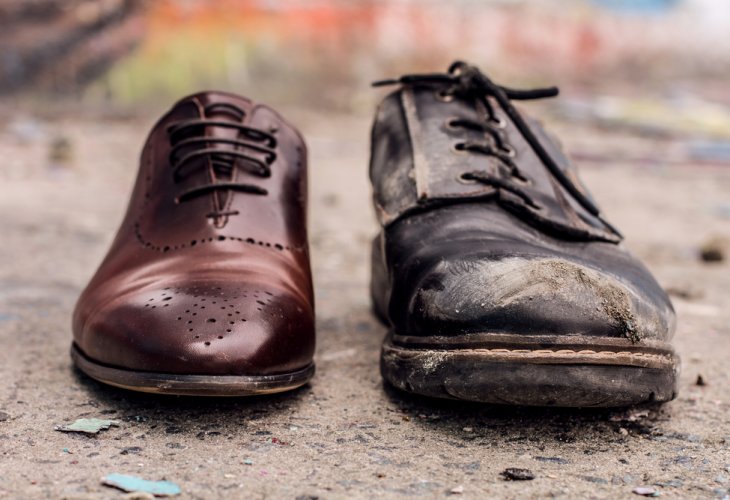Personality Development
The First Thing You Must Change to Succeed In Life
The way we view ourselves impacts who we can become.
 (Photo: shutterstock)
(Photo: shutterstock)Previous article: Why Do We Harm Ourselves?
If we dig a little deeper and look beneath the surface, we’ll disover that the reason someone may fear success and see it as a threat isn’t because success itself is scary, but because of the way that person sees themselves. People who don’t view themselves as capable or successful often have a hard time believing that they can sustain success. The doubt creates tension and fear that they will eventually fail. Many times, that fear stops them from ever moving forward.
They say that if you were to switch the lives of rich people and poor people in a single day, each group would eventually find its way back to where it started — the rich would become rich again, and the poor would end up poor again.
The reason for this is that wealth and poverty aren’t only about money- they are rooted in how we see ourselves. A wealthy person generally feels comfortable with success. They believe that they deserve abundance, and they trust that it will last. A poor person on the other hand, may associate wealth with negative sentiments. They may feel unworthy of success, worry that others will envy them, or believe that being rich results in arrogance or greed.
Of course this doesn’t apply to every single person, but in many cases, a person’s financial situation reflects how they view themselves and their relationship with the idea of wealth.
Where does this mindset come from, especially for someone struggling financially? It’s often not the result of deep analysis or reflection but generally happens in a simple, almost automatic way. When someone is facing financial hardship, it’s hard to deal with the gap between their reality and the seemingly successful lives of others, and so to make that easier to handle, they start creating a kind of personal “ideology.” Instead of seeing poverty as a challenge they can overcome, they turn it into a kind of virtue. They tell themselves, “I don’t want to be rich anyway — rich people are selfish and proud,” and this helps them feel more at peace with their situation.
Could that person work harder and try to break out of poverty? Probably. But instead, they stay where they are. They justify their place, cling to it, and stop moving forward. Instead of facing the uncomfortable gap between where they are and where they want to be, they develop a distorted view of themselves and of what's possible. That belief keeps them stuck.
What you believe, becomes your reality
This idea appears in ancient Jewish texts. The Maharal, a famous Jewish thinker, discusses a passage in the Talmud (Bava Metzia 33a) that says: if someone finds both their own lost item and their father's lost item, they must return their own first. Why? Because you have to take care of yourself before you can take care of others.
The Talmud backs this up with a verse that says, “There shall be no needy among you.” This implies that a person has a responsibility to avoid falling into poverty. But then the Talmud warns: “Whoever constantly worries about being poor — will eventually become poor.”
This is because excessive fear of poverty can actually bring it about. A person must strike a balance between caring for themselves and caring for others. That balance is key to keeping financial hardship at bay.
The Maharal explains that if a person is constantly afraid of poverty, they give that fear power and begin living as if poverty is already part of them. As Job said, “What I feared has come upon me.” The more you fear something, the more you give it space to take root in your life. In a sense, you’re subconsciously helping it come true.
The Maharal provides the following metaphor to explain this: Imagine putting a wooden plank across a river and trying to walk across it. You’d probably feel shaky and nervous — and there’s a good chance you’d fall. But if that same plank were on solid ground, you’d walk across it easily. The difference isn’t in the plank, but in your mindset. When you focus on the fear of falling, that fear affects your balance. Your mind and thoughts shape your experience.
The same is true in life. When we adopt a belief about ourselves — especially a fearful one — it tends to come true. When we choose to believe in our potential, and operate from a place of confidence and clarity, we can move forward and make progress.
There’s a story (probably fictional, but still meaningful) about a poor man who was asked, “What would you do if you were as rich as Rothschild?” He replied, “I’d make sure all the buildings in town had only one floor, so I wouldn’t have to climb stairs while begging!” This story reflects a sad truth: when people identify with poverty (or any limitation), they begin to see it as part of who they are. It becomes their “identity,” and that identity stops them from changing.
If someone wants to change their life, they must first change how they see themselves and their situation. This doesn’t just apply to poverty — it’s true for anything: lack of confidence, struggles in school, career instability, or even social difficulties. As long as someone holds onto a limiting belief about themselves, they’ll keep living it out, often without even realizing it. The moment they shift their perspective — that’s when real change begins.

